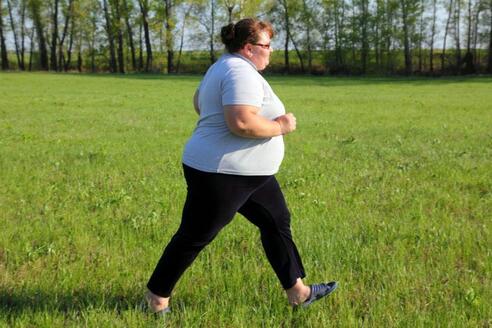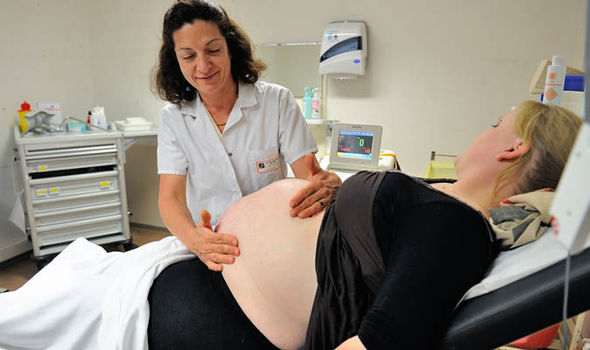 Exercise During Pregnancy Keeps You Fit & Active Irrespective of Your Weight Exercise During Pregnancy Keeps You Fit & Active Irrespective of Your Weight Obesity is bad on any given day for anyone. It exists as the root cause of a number of health-related illnesses and problems right from cardiovascular disease to cancer. Worse is the presence of obesity in pregnant women as it poses a great challenge to patient care. Obesity has become a worldwide epidemic and approximately 50% of women of childbearing age are overweight (BMI between 25 and 29.9) or obese (BMI>=30). Such vagaries in weight puts both the mom and the baby at risk during pregnancy (antenatal, intra- and post-partum complications) and even after childbirth. The side effects of obesity on pregnancy is a long-standing list that includes preterm birth, gestational diabetes mellitus (GDM), risk of impaired glucose tolerance, high risk of miscarriage, pre-eclampsia, thromboembolic disease and maternal death. Obese women are likelier to undergo induced labor, spend excess time in labor, have instrumental deliveries or even have a post-partum hemorrhage. The announcement of pregnancy brings joy and happiness to the entire family, especially the couple involved. The pregnant woman is pampered and cajoled with gifts, blessings and specifically, sweets and mithais. The elders in the family bless her and treat her taste buds with oodles of high-calorie tasty treats to show their love and affection. Often the pregnancy woman is misguided with concepts such as ‘eat for two’ which induces her to double her portion sizes and increase intake. On the other side, improving health outcomes in obese/overweight individuals is an important research topic that needs answers quite soon to stop the obesity epidemic from ruining the health and well-being of the future generations. Jumping Beyond the Weight Gain Fence Weight gain during pregnancy is recommended and there are no second thoughts on it. Its only the range that varies depending on your existing body weight. Women with a healthy weight range (BMI 18.5-24.9) are recommended a 11.5-16 kg gain during pregnancy, overweight women are recommended to gain between 7-11.5 kg and obese women between 5-9 kg during pregnancy. Sticking to these limits forms a part of routine care during pregnancy. Weight gain beyond these stipulated ranges are dangerous and excess weight gain in obese women can result in preeclampsia, hypertension and shoulder dystocia. This is where disciplined dietary interventions are of immense help in minimizing these risks and ensuring better maternal and fetal outcomes. While dietary interventions in normal or overweight women do reduce pregnancy-related risks there have been not many successful dietary interventions reported in obese women. But episodes of mindless eating and food cravings have been commonly witnessed in obese women who aren’t pregnant. The study discussed below gives an elaborate idea of an individually tailored nutrition program for obese pregnant women which improves overall diet quality, limits gestational weight gain (GWC) and reduces complication during and after pregnancy. Individual-tailored Nutrition program for Obese Pregnant Women The study included women with BMI ≥30 and ≤35 and women having BMI between 35 and 37 were included if they had no other medical complications. The research ensured that all of the women involved were ≤21 weeks of gestation and ≥18 years of age. The dietary intervention group was met by a registered dietitian who consulted the women and recommended them to eat a healthy diet. They were given tips on replacing empty-calorie meals with nutrient-dense foods and also were taught to control portion sizes during every meal. Nutrients such as iron, folate and vitamin D which are of utmost importance for the development of the fetus were also advised alongside the diet menu. The other group, namely the control group did not receive any complimentary service from an RDN but only were entitled to the standard care that included a provision of verbal/written information on healthy eating during pregnancy given by their gyneac. Volunteers’ height was measured at the start of the study and weight measures were taken during every visit to the hospital. Weight history and pre-pregnancy body weight data of the diet intervention group were collected by the dietitian at the beginning of the study. Their maternal weight at six weeks and six months post-partum were noted by the dietitian. The dietitians also noted dietary information at the start and end of the study and an improvement in diet quality was analyzed based on the median change in the intake of six food groups that included vegetables, fruits, whole grains, lean meats and poultry, fish, eggs, tofu, nuts and legumes, milk, yoghurt, cheese and alternatives and discretionary items. Study Results The control group included 119 obese pregnant women and the diet group included 92 of them. Women in the control group had a lower BMI (30.3) compared to those in the diet group (32.9). Asian women were predominantly present in the control group (39%) compared to the diet group (10.9%). 19.3% (23 of 119) women in the control group developed GDM while only 6.5% (6 of 92) women in the dietary intervention group developed GDM. GWC did not show much difference between the two groups-overall 9.7 kg weight gain in the control group and 10 kg gain in the diet group. Six weeks after childbirth 54 women (58.7%) were available for contact by phone and they had a mean weight loss of 10.7 kg and 72% of them had returned to their initial antenatal assessment weight. 18 women were available for contact six months after delivery and they had lost 14.6 kg and 83% were at their initial assessment weight. Consumption of fruits and vegetables significantly improved, intake of discretionary items declined and more women were opting for healthier meal options such as trimming fat off meat or removing poultry skin. Most individuals started consuming more whole grains and low-GI products at the final stage of assessment. All these significant changes show that bringing in a registered dietitian nutritionist to plan a tailor-made diet for obese pregnant women is indeed useful in improving their diet quality in terms of improved consumption of fruits, vegetables and whole grains and monitoring weight increase in them. This study also clearly showed that GDM showed improvements irrespective of GWG changes. Hence, planning your diet and executing it diligently to avoid obesity-related complications in pregnancy is essential for a healthy mother and infant. UPBEAT Trial In this research, the study team analyzed for changes in health based on healthy dietary interventions and increased physical activity comparing it to standard antenatal care in UK. The group specifically checked for incidence of gestational diabetes, large-for-gestational-age babies, preeclampsia, preterm birth, mode of delivery and physical activity ranges. Both, the dietary intervention or the control group did not show any changes in incidence of gestational diabetes nor many other measures given above. Total gestational weight was lower in the intervention group compared to the control group and individuals who received dietary guidance showed improvements in dietary pattern and exercise routines too. This trial too shows that a mixed intervention of both diet and physical activity did not show any effects on gestational diabetes and so did the LIMIT trial which included overweight and obese pregnant women. A healthy diet with lifestyle intervention reduces the possibility of weight gain during pregnancy but there is no guarantee for improvements in gestational diabetes. At the same time, statistics of weight reduction are a sign of minimal risk of getting into another pregnancy as an obese lady. Maternal Eating Behavior One study focused on the maternal eating pattern in obese pregnant women and identified those behaviors that contribute to the quality of the diet. This was an observational study where the participants were observed for their dietary intake and eating patterns by a validated food photography method for 6 days between 13 and 16 weeks of pregnancy. All the participants were having a BMI >30 and were aged between 18 and 40 years. Diet quality was based on macronutrients intake and intake of calcium, iron, vitamin C, sodium and fiber. Results of the 56 participants showed that:
References A Behavioral Nutritional Intervention for Obese Pregnant Women: https://obgyn.onlinelibrary.wiley.com/doi/pdf/10.1111/ajo.12474 Diet and Lifestyle Interventions for Obese Pregnant Women: https://www.thelancet.com/action/showPdf?pii=S2213-8587%2815%2900253-3 Behavioral Determinants of Objectively Assessed Diet Quality in Obese Pregnancy: https://www.mdpi.com/2072-6643/11/7/1446 Comments are closed.
|
AVOID FRAUD. EAT SMART+91 7846 800 800
|
- Home
- Written Testimonials
- Consult
- Clinics
- Blogs
-
Diet & Nutrition
- Diabetes Reversal
- IVF IUI not needed for PCOS PCOD Infertility
-
Medical Nutrition
>
-
Disease & Conditions
>
- Infertility | PCOS
- Diabetes Mellitus
- Cholesterol
- Hypothyroid
- Kidney Problems
- Hypertension
- Cardiovascular Diseases
- Liver Diseases
- Gastro intestinal disorder
- Cancer
- Metabolic Disorders
- Orthopedic Disorders
- Eating Disorders
- Dietary Recall
- Weight Record Filled By Clients
- Online Payment Transaction Details
- Online Clients Weight Check Form
- Our Program Package Service Charges
- Weight Record 2017 Clients
- Measurements sent by Clients
- Terms & Conditions Of Payment
- Thanks. Your Form is Submitted
- Video Testimonials
- Lifestyle & Wellness
- Lifestyle & Wellness Blog
- Allergy & Intolerance
- Weight Loss / Gain
- Weight Loss / Slimming Blog
-
Disease & Conditions
>
- Life Cycle Nutrition >
- Sports Nutrition >
- Integrity in Nutrition
- Knowledge Centre
© COPYRIGHT 2022. ALL RIGHTS RESERVED. FRST HEALTHCARE PVT LTD.
Dr. Nafeesa Imteyaz of First Eat Right clinic, is the Best Dietitian Nutritionist in Bangalore. Best Dietitian Nutritionist in Pune. Best Dietitian Nutritionist in Hyderabad. Best Dietitian Nutritionist in Chennai. Best Dietitian Nutritionist in Mumbai. Best Dietitian Nutritionist in Delhi. Best Dietitian Nutritionist in Kolkata.



